|
|
|
Sort Order |
|
|
|
Items / Page
|
|
|
|
|
|
|
| Srl | Item |
| 1 |
ID:
192851
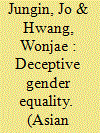

|
|
|
|
|
| Summary/Abstract |
Despite achievements in women’s economic and political empowerment, gender inequalities persist in the key socioeconomic areas of health and education in Laos. How can we explain these gaps in equality? We analyze how Lao people perceive gender equality and how differences in the perception of multiple dimensions of gender equality affect women’s rights in healthcare and education. The results of a 2023 survey of 664 Laotians highlight the perception of equal responsibilities as the key dimension of gender equality, which may limit the improvement of gender equality in health. The results imply that female leadership and greater public consideration of gender equality with respect to rights and opportunities may promote gender equality in Laos. This study contributes to the study of perceptions and practices of gender equality in non-Western countries.
|
|
|
|
|
|
|
|
|
|
|
|
|
|
|
|
| 2 |
ID:
096689
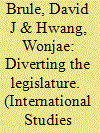

|
|
|
|
|
| Publication |
2010.
|
| Summary/Abstract |
Given distinct partisan macroeconomic preferences, the partisanship of the president or majority in Congress should influence presidential decisions to use force in the face of poor economic conditions-the diversionary use of force. But previous research posits contradictory accounts of the influence of partisanship. We seek to resolve this debate by developing a game theory model, which predicts that leaders divert when government is divided and economic conditions hurt the opposition party's constituency. Leaders seek to divert the legislature from the economy in order to prevent the legislature from passing a remedial economic bill. Analyzing US conflict behavior since World War II, we examine the conditional influence of presidential partisanship and the president's cohesive partisan support in Congress on the effects of inflation and unemployment. Consistent with the model's predictions, we find that as their cohesive partisan support in Congress declines, Democratic presidents tend to use force in response to inflation and Republican presidents tend to use force in response to unemployment.
|
|
|
|
|
|
|
|
|
|
|
|
|
|
|
|
| 3 |
ID:
151727
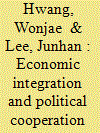

|
|
|
|
|
| Summary/Abstract |
South Korea has traditionally maintained close ties with the United States, especially for external security, while more recently it has become closer to China, mainly for economic reasons. In this article we examine whether growing economic ties between South Korea and China promote their cooperation and common policy preferences and simultaneously weaken Korea-US relations. We examine the voting congruence of South Korea and China in the United Nations General Assembly between 1991 and 2012 and find no clear evidence that economic integration promotes congruence. Rather, South Korea's policy preferences are usually determined by independent consideration of issues.
|
|
|
|
|
|
|
|
|
|
|
|
|
|
|
|
| 4 |
ID:
135059
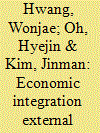

|
|
|
|
|
| Summary/Abstract |
Purpose—This study examines whether economic integration between South and North Korea has promoted political cooperation and whether external forces are still a dominant factor in explaining their behavior. Design/methodology/approach—This study is based on a quantitative analysis of roll call data in the United Nations General Assembly (UNGA) between 1991 and 2011. Vote coincidence between South and North Korea is examined. Findings—Empirical results show that economic integration does not generate significant effects on cooperation between the two Koreas, while their vote coincidence is strongly influenced by the political positions of the U.S. and China. Meanwhile, the two Korea’s tend to agree on economic issues but show dissimilar voting patterns over nuclear, security, and human rights issues.
Practical implication’s—The findings imply that economic and humanitarian cooperation between South and North Korea cannot be easily transferred to political cooperation in other areas without drawing support from powers such as the U.S. of economic integration on cooperation, efforts to reduce the North’s security concerns resulting from asymmetric dependence need to be followed.
|
|
|
|
|
|
|
|
|
|
|
|
|
|
|
|
| 5 |
ID:
141489
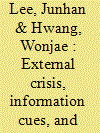

|
|
|
|
|
| Summary/Abstract |
As information cues grow diverse, the public becomes better equipped with the information necessary to independently judge external crises, and thus their support for the president is less likely to be influenced by elite discourse. Our analysis of South Korean presidential popularity (1993–2008) confirms this expectation.
|
|
|
|
|
|
|
|
|
|
|
|
|
|
|
|
| 6 |
ID:
131001
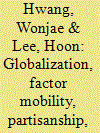

|
|
|
|
|
| Publication |
2014.
|
| Summary/Abstract |
This paper examines the relationship between economic globalization, factor mobility, government partisanship, and the relative budgetary salience of two different instruments of compensation policies: social welfare spending and industrial subsidy provision. While welfare spending directly benefits labor, industrial subsidies benefit both capital owners and labor along the sectoral line. Based on both factoral and sectoral models of trade, we theoretically argue and empirically show that governments are more likely to use welfare politics as compensation policies if free trade generates class-based interests in the society, and subsidy politics if trade openness promotes industry-based interests. We also argue that the interactions of the three variables are contingent on government partisanship. When non-class-based interests are salient as a consequence of trade openness, left-wing governments are likely to focus on welfare politics while right-wing governments favor provision of subsidies. However, when class-based interests are salient, even right-wing governments behave similarly to left-wing governments, favoring welfare spending over subsidies as the key compensation policy. In the analysis of compensation policies in the OECD countries between 1980 and 2001, the test results confirm our expectation
|
|
|
|
|
|
|
|
|
|
|
|
|
|
|
|
| 7 |
ID:
176136
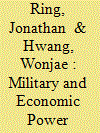

|
|
|
|
|
| Summary/Abstract |
Is the Kim Jong-un regime genuinely pursuing a peaceful solution, to eventually give up its nuclear arsenal, after a series of summits and negotiations with the US and South Korea? We examine how military and economic power networks on the peninsula are associated with the prospect of North Korea’s denuclearization. North Korea could use its nuclear weapons program, an internal tool designed to promote national security and power, to build up power in both military and economic power networks. Drawing lessons and speculation from the literature on states’ hedging behavior, and using agent-based models, we explain that denuclearization as part of a hedging strategy would be a viable policy option for North Korea.
|
|
|
|
|
|
|
|
|
|
|
|
|
|
|
|
| 8 |
ID:
117659
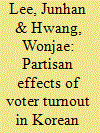

|
|
|
|
|
| Publication |
2012.
|
| Summary/Abstract |
This paper explores the partisan effects of voter turnout in 12 Korean elections. We argue theoretically and show empirically that hypothetical increases in turnout generate benefits for left-wing or minor parties, rather than right-wing or major parties. Complete voter turnout may have changed the actual electoral results in close elections.
|
|
|
|
|
|
|
|
|
|
|
|
|
|
|
|
| 9 |
ID:
190040
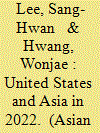

|
|
|
|
|
| Summary/Abstract |
The past year witnessed active movement in the Indo-Pacific region to form or consolidate partnerships around shared values or interests. While tensions with China and threats from North Korea mounted, the Biden administration’s strategy toward a free and open Indo-Pacific gained ground in many Asian states but evoked only lukewarm reactions in others. Ongoing and new challenges such as the COVID-19 pandemic and Russia’s invasion of Ukraine tested the US leadership. Washington will need wisdom and patience to maintain solidarity among its allies and partners and avoid a self-fulfilling prophecy of armed conflict in its relations with China.
|
|
|
|
|
|
|
|
|
|
|
|
|
|
|
|
| 10 |
ID:
173935
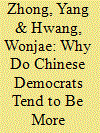

|
|
|
|
|
| Summary/Abstract |
Popular nationalism remains strong in China. What drives this strong nationalistic sentiment? This is the key question this study attempts to answer. The authors are particularly interested in the connection between domestic politics and outward nationalist feelings among Chinese urban residents, specifically the relationship between democratic orientation and regime support on the one hand and nationalist feelings on the other. Descriptive findings from random survey data on Chinese urban residents in 34 Chinese cities reveal that democracy-oriented Chinese urbanites tend to show stronger nationalistic feelings. A large volume of literature on the relationship between democratic value and nationalistic sentiments, however, generally suggests that people with more liberal democratic values tend to be less nationalistic. How should one, then, reconcile and explain this seemingly contradictory relationship in China? Upon further research, the study finds that system support is a confounding factor affecting Chinese urban residents’ nationalistic sentiments. People with more nationalistic feelings tend to be those who show less support for the current system in China. Popular political discontent with the Chinese domestic system may very well have a spill-over effect on Chinese people’s nationalist feelings toward the outside world.
|
|
|
|
|
|
|
|
|
|
|
|
|
|
|
|
|
|
|
|
|